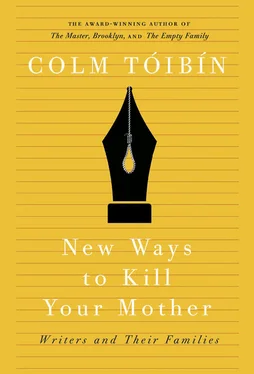Just as it is possible to read the character of Rosie Muniment, the witty invalid, in The Princess Casamassima as a version of Alice James, we can also read the children Miles and Flora in The Turn of the Screw , written three years after Alice’s death, as versions of the two James siblings, Henry and Alice, who both lived unmarried and in exile in England, oddly abandoned and orphaned and, in certain ways, emotionally unprotected. In February 1895 James wrote in his notebook the idea of a
possible little drama residing in the existence of a peculiar intense and interesting affection between a brother and a sister… I fancy the pair understanding each other too well — fatally well… [They] abound in the same sense, see with the same sensibilities and the same imagination, vibrate with the same nerves… Two lives, two beings, and one experience.
Although he never wrote this story, the notebook entry is fascinating for anyone interested in James’s nonchalant masculinity and Alice’s neurotic inertia, as it is for anyone looking at the richly complex emotional and creative life of Henry James and the diaries and letters of his sister Alice.
In his Memoirs , Tennessee Williams, a writer both homosexual and hypochondriac who also devoted fierce energy to his work while his only sister suffered from a mysterious mental illness, wrote about his relationship to his sister Rose:
I may have inadvertently omitted a good deal of material about the unusually close relations between Rose and me. Some perceptive critic of the theatre made the observation that the true theme of my work is ‘incest’. My sister and I had a close relationship, quite unsullied by any carnal knowledge… And yet our love was, and is, the deepest in our lives and was, perhaps, very pertinent to our withdrawal from extrafamilial attachments.
Henry James and Tennessee Williams each marvelled at his sister’s own prose style in diaries and letters. Alice’s diary, James wrote, ‘is heroic in its individuality… and the beauty and eloquence with which she often expresses this, let alone the rich irony and humour, constitute… a new claim for the family renown. This last element — her style, her power to write — are indeed to me a delight.’
Williams in his Memoirs quoted from Rose’s letters: ‘I remember one that began with this phrase: “Today the sun came up like a five-dollar gold piece!” Or another in which she wrote: “Today we drove in town and I purchased Palmolive shampoo for my crowning glory.”’
In his two best early plays, Williams dramatized relations between siblings, one of them watchful, the other damaged and insecure; each contains a key moment in which the weaker sibling loses her moorings. In The Glass Menagerie (1944) Laura’s brother writes poems, admires the work of D. H. Lawrence and works in a shoe warehouse, as Williams did, while Laura herself is, like Rose and indeed like Williams himself, immensely fragile and sexually insecure. (The mother in the play was, according to Williams’s younger brother, so accurately based on their mother that she could have sued.) In the play, Laura is psychologically broken by the visit of one gentleman caller; in life, Rose’s troubles began when she was abandoned by her ambitious boyfriend after her father had lost part of his ear in a fight at an all-night poker game, thus ruining his chance of further professional advancement. ‘Her heart broke, then,’ Williams wrote, ‘and it was after that that the mysterious stomach trouble began.’
As he worked on A Streetcar Named Desire , which was produced in 1947, Williams was living in New Orleans with his boyfriend Pancho Rodriguez. In his notebook he wrote about the difference between them: ‘He is incapable of reason. Violence belongs to his nature as completely as it is abhorrent to mine.’ According to a friend, ‘Tennessee behaved very badly toward Pancho, and he did so by using Pancho for real-life scenes which he created — and then transformed them into moments of A Streetcar Named Desire .’ Thus Pancho, rough, less educated than Williams, became Stanley to Williams’s Stella. The drama begins when Stella’s unstable sister comes to New Orleans and has, eventually, to be taken away. Some of the most fruitful moments in Williams’s work came when he found metaphors in drama for what had really happened to him and his sister Rose.
Williams in his art thus gave shape to his life, or to the parts of it that really interested him. The other sources for his life that he left have to be read judiciously. His impressionistic book Memoirs , for example, which he wrote in 1975 at the age of sixty-four, in the words of his biographer Donald Spoto, ‘conceals more than it shares, misrepresents more than it documents, omits major events, confuses dates and… tells virtually nothing about the playwright’s career’. Williams’s letters as source material are more useful, but they tended to be written to amuse and suit their recipients. Thus his notebooks, which he kept, mostly in diary form, between 1936 and 1958 and again briefly between 1979 and 1981, and which have been edited and annotated with fastidious care by Margaret Bradham Thornton, are the best guide we have to his life and his moods. About many aspects of him, this new volume is invaluable.
The entries we have begin when Williams was twenty-five and living with his family, struggling under considerable pressures to find a voice as a poet, short story writer and playwright. These pressures might explain the tone of self-obsession, self-pity and despair. The entries seem to have been written at night and he himself became alert to their morbid self-indulgence, quoting Nietzsche: ‘Do not let the evening be judge of the day.’ While he was trying to impress everyone in his creative work, in these pages he wished to impress no one and thus could be brutally honest about his own failings. It is interesting that when he found success and fame the tone did not change much, even when he had many lovers, enough money to travel and lots of friends and admirers. He still, when he came to write in his notebooks, felt at times sorry for himself but at other times something more interesting and convincing, a huge unease about being in the world at all, which nothing, no matter how thrilling, could lift or cure.
There is never a moment in his notebooks when he congratulates himself on mastering the structure of a new play or creating a new and memorable character or on that precise day writing a speech that worked wonders. Only a few times did he write about technical problems. (His observation that ‘the tragedy of a poet writing drama is that when he writes well — from the dramaturgic technical pt. of view he is often writing badly’ stands out in this book.) He did not jot down ideas as they came to him, as Henry James did, so we do not see in these pages the growth of his most important plays from a single entry. Instead, Williams noted what he was creating as a burden or a dull fact, including scenes he was rewriting or demands from directors and producers. Often, on rereading work in progress, he noted its badness. Precisely how his creative process operated he kept to himself. Instead, he wrote about who had irritated him or pleased him during the day, or how nervous he felt, how many pills he took or how much alcohol he consumed, or how many lengths of the pool he swam. He noted his fears and dreams.
It is strange how out of all of this mostly inchoate and random writing, a sense of a personal vision emerges that would make its way into the very core of Williams’s main characters and scenes. These entries capture an authentic voice, an artist alone and deeply fearful and unusually selfish. Many of his most whining entries were written on the very days when he was producing his most glittering work. His whining was not a game or done for effect; it seems, indeed, a rare example of whining both sincere and heartfelt. Even when he was at his most successful, he could, for example, write: ‘Today the dreaded occasion of reading over the work and the (almost but never quite) expected fit of revulsion.’ Tennessee Williams meant business when he whined. And thus somehow he managed to connect his own dark and obsessive complaints about his works and days, his own dread of life, to his characters and their fate. These notebooks, precisely because they were not intentionally created as raw material for work, now seem to be the rock on which his creations, sparkling and vivid versions of himself, were built.
Читать дальше












